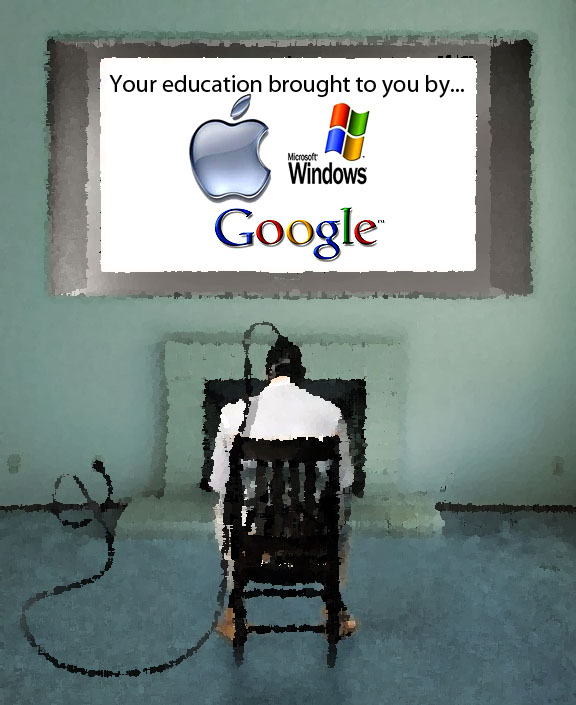Between questions of how student data is being used and technology monopolists pushing for standardization in edtech, I’m left with an uneasy feeling. As we reach a tipping point in digital educational technology we simplify and standardize to the point where the people doing the teaching don’t know or care what happens behind the curtain. What is happening behind that curtain is being decided in closed rooms between multi-national corporations and governments. The bait is a ‘free’ digital learning system for education. The payoff is habituated users and data mining on a level unprecedented in history, and we’re happy to sell our students and ourselves into it in order to get the freebies.
If this were all happening in the light of day I’d be a lot happier about it. That it’s happening behind closed doors and shouldn’t be publicized is something that should concern everyone.
If you’re not paying for it you’re the product being sold. Corporations may state that they do no evil but they aren’t after what education is after, they are after profit. That student information is being brokered well beyond the reach of educational institutions by these information merchants should be a cause of concern, but instead I see public educators increasingly branding themselves with corporate logos and shouting their evangelism from the social media rooftops.
Technology is exciting, and digital technology is such an intimate thing because it nestles up to our minds. Our habit of elastically coupling with our technology suggests that digital-tech is going to become an intrinsic part of how we see ourselves. People are already describing unplugging as feeling like an amputism, it’s only going to become more entwined, especially as we begin to wear our digital selves.
I’m reminded of Kenneth Clark‘s unsettling end to what many consider to be the best documentary series ever created, Civilisation…
That one of the most intelligent observers of human society was pondering this in the year I was born lurks in the back of my mind. Machines that make decisions for us, many educators seem thrilled with this idea. You may be all gungho over the latest shiny i-thing or googly-eyed over that app that will revolutionize your teaching, but the true costs of these things are a carefully kept secret. At the very least, when we adopt a single digital ecosystem (no matter how free it is), we’re selling our students (and our own) habitual technology use into a closed environment.
As educators it should be a goal to recognize tools in terms of what they can do rather than how easy they are and how well integrated they come. And we should never be deciding on a tool that inserts itself into the learning process based on how little we’re expected to learn about it. Technology and the internet aren’t Google, and tablets aren’t Apple. Computers aren’t Microsoft. Only by offering students access to all of these things and more are we approaching the teaching of technology in as complete and well rounded a way as possible.
Over the past ten years I’ve watched education stagger into digitization always hesitant to change old ways, and I’ve pushed as hard as I can to encourage that change. Only by catching up to this revolution can we hope to prepare students for the strange world that awaits them. Now that we’re at a tipping point I’m watching what could be a powerful new fluency being boiled down into canned access to technology, always under a single brand. Instead of teaching technology like it’s becoming an intimate part of our lives (which it is), we pass it off with idiotic notions like ‘digital native‘ that allow people who have no interest in learning technology to also off-load the responsibility of teaching our children about technology. Into that ignorance vacuum corporations have crept, offering you an easy solution, and most people are more than happy to take it even if it means being walled in to a monopoly.
I wrote last on the idea of being a tech-ronin, a digital samurai without a master. That works for me but I come from a time before data dictated who I am. I’m worried about my students. In a world where we’ve sold them into digital servitude as data sheep (call them digital natives if that makes you feel better), the only way out is to know the system well enough to circumvent it. Instead of teaching a closed, monopoly limited mindset in technology that serves everyone except my students, I want them to develop a broad understanding of digital tools and how they work. In a broad edtech learning environment my students will develop a meta-cognitive view of both technology and how they are represented by it. In a time where we are increasingly defined by our data the only free people will be the ones who have a sense of themselves beyond their student record in the LMS.
My department logo has ‘learn how to build the future’ on it, but perhaps I need to make a change just to give my students a chance to self-realize beyond whatever data metric they are being sold into.
 |
| Rage against the machine |

